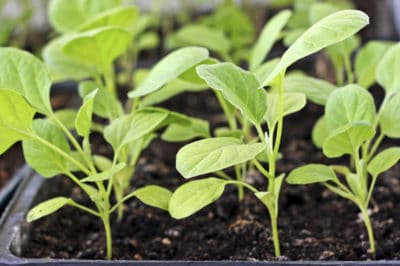When Are Eggplant Seedlings Ready for Transplanting
If you started your eggplants from seeds, make sure the seedlings are from 6 to 8 inches tall. They should have at least three sets of leaves. When the seedlings are this size, they are strong enough to grow deep roots into the soil.
Harden Off the Seedlings
Prepare your seedlings for the adjustment to outside weather by hardening them off for a few days before transplanting. You do this by placing your flats or pots outside during the day, and bringing them back inside at night. You can also put the seedlings in an outside area that’s sheltered from wind and direct sunlight for about three days before transplanting them.
Climate Conditions
Before transplanting your eggplant seedlings, the temperature should be from 70°F (21°C) to 85°F (29°C). Eggplants are very sensitive to cool weather, especially seedlings. If it gets too cold, the eggplant’s leaves will turn black and drop off, so it’s very important to have consistently warm weather.
Soil Temperature
Like the outside temperature, the soil must also be warm for successful eggplant growing. It needs to be at least 60°F (15°C) before you transplant eggplant seedlings. It can take up to three weeks of sunshine after the last frost for the soil to warm up to acceptable temperatures for eggplants. If you live in a cool climate, you can heat up your soil to make it ready for transplanting.
The following two methods can warm up your soil for eggplant transplanting:
- Plastic mulch – Spread plastic mulch over the soil a few weeks before planting time. The plastic holds in the heat, warming the soil quickly.
- Raised beds – Constructing raised beds, and filling them with soil holds more heat. The sun can heat the soil in raised beds quicker than soil in the ground.
Soil Conditions
Once you determine that the soil is warm enough, make sure that it is fertile and a bit acidic. You can use a pH testing kit to see if your soil meets the pH requirements of 6.0 to 6.5, which is ideal for eggplants. If the soil doesn’t have the correct pH or acidity, you can add organic fertilizer to the soil, making it a fertile growing environment to transplant your eggplant seedlings.
